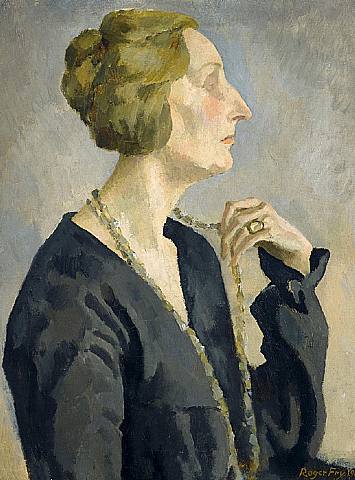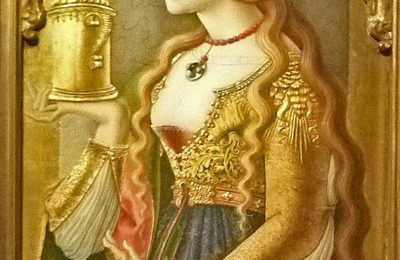We were at a restaurant in the city of Pittsburgh the other night, and I happened to glance over at the bar. A person sitting there caught my eye: an elderly woman reading a book, breaking her reading only to eat her meal, and sip a tall glass of wine. She possessed a great head of white hair, and was wearing a pale flowered, almost calico-like, dress. Her figure was a bit round; definitely not the type promoted in magazines, and gyms. She was alone, and seemed completely content to be thus.
I imagined that she was a poet.
When I looked at her, images passed through my mind, memories of elderly women I had known in my childhood: confident, strong, feminine. You see, the older women of my youth had been raised by mothers who had been raised in the last throes of the Victorian era, and they were strong women. The feminist movement claims to have emancipated women, but I think they have chained them up to numerous false ideas, one being that women must acquire masculine-like figures, specifically, to the idea that their bodies are not naturally soft, that such marks of femininity must be eradicated at something known as a gym. The elderly women I knew in my youth cared about looking pretty, and feminine, well put together, you might call it: a blue brooch pinned on the collar of their blue-green blouse, told me this. They loved Beauty, but they did not attempt to look like what the young people call, buff and/or sexy.
The other night, it was comforting to see the woman at the bar: a gem, a forgotten World. It was as if a garden gate had opened, and there before me was a lawn of endless grass, trimmed by boxwoods, and scented with roses; all colors were heightened there, and laughter could be heard therein.
She was free.
This lone Woman was an old school Woman, a force to be reckoned with, one that knew her name, and her identity was rock-solid (even if her body was soft and feminine); a woman that would shake her husband and children into respectable people by the mere look of the eyes, a sudden stop in her activity; or, if she were single, another Dame Edith Sitwell, a walking fire, she was, indeed, all leaves.
Young readers might laugh at such descriptions.
They might not have encountered such a woman. I hope they do.
Yes, she is a rare breed today, and I am loathe to admit that even Catholic women have succumbed to the mantras of feminism. They have accepted some of the false (chaining) ideas of feminism, i.e., that I will decide how many children I shall bear, or later in life, once the children are raised, my time is my own. Such sentiments do not exist in Roman Catholicism. In Roman Catholicism, a person is meant to do the will of God, not their own will. God’s will is often at odds with our own will, or the idea we once thought of how our life would proceed. A constant adjustment, of sorts, is always in order as God’s will unfolds in our lives. It is difficult, but being a member of the Church Militant is a constant combat, and a part of the combat, is the combat against self-will. It is interesting to note, that when a person follows God’s will, they are actually strengthened, that is how God is: good, loving, kind, caring for His children in mysterious ways vs following self-will, which is fickle and prone to the whims of the spirit of the age which cares nothing for the person, and goes about destroying its own (think of the abortion culture). God is the God of love and life. He holds the identity of His children in His loving hands as the Creator. He wishes to live with His creatures for eternity in Heaven (see the Baltimore Catechism). Oh, I am going on; back to the story, which reminded me of Alice Thomas Ellis.
The late English Catholic writer, Alice Thomas Ellis, aka, Anna Haycraft (b. 1932- d. 2005) fought against the encroachment of feminist ideas into Roman Catholicism, and into the world, as seen in the following:
Late in her life, when her journalism was at its most uncompromising, Anna mocked her generation of feminists, and the “dreadful breed of feminist men”. She mourned a womanhood that she had known in inter-war Liverpool: tough, funny, capable women who could handle a scythe or smoke a pipe. She also mourned the womanhood of early Hollywood actresses: sharp-tongued, elegant, clever, feminine and moral: “Katherine Hepburn, Joan Crawford, Bette Davis etc, none of whom resemble in the least the downtrodden wimps so crucial to the feminist myth.” (source)
G.K. Chesterton (b. 1874- d. 1936), too, bemoaned what he saw as the decline in the interior strength of women as the propaganda of feminism worked its way into the English population of his day. He recalled the Victorian-era women of his youth, and remarked that they were not the shrinking violets feminists purported them to be, he said:
“I have little doubt that when St. George had killed the dragon he was heartily afraid of the princess.”
That is humorous, to say the least, but it contains a nugget of truth regarding that sort of woman he remembers from his days in the nursery.
Today, I am thankful for having caught a glimpse of a reverse-Rebel at the restaurant bar.
A universe of independence and of strength.
A flaming bush in a world of sameness.
A light in the darkness.
An iron rod to stay the breaking door.
A mountain of thought.
A tender arm to hold the weak.
A soft place to land when bad news strikes.
A real Woman.
From the Book of Proverbs:
31:10 Who can find a virtuous woman? for her price is far above rubies.
31:11 The heart of her husband doth safely trust in her, so that he shall have no need of spoil.
31:12 She will do him good and not evil all the days of her life.
31:13 She seeketh wool, and flax, and worketh willingly with her hands.
31:14 She is like the merchants’ ships; she bringeth her food from afar.
31:15 She riseth also while it is yet night, and giveth meat to her household, and a portion to her maidens.
31:16 She considereth a field, and buyeth it: with the fruit of her hands she planteth a vineyard.
31:17 She girdeth her loins with strength, and strengtheneth her arms.
31:18 She perceiveth that her merchandise is good: her candle goeth not out by night.
31:19 She layeth her hands to the spindle, and her hands hold the distaff.
31:20 She stretcheth out her hand to the poor; yea, she reacheth forth her hands to the needy.
31:21 She is not afraid of the snow for her household: for all her household are clothed with scarlet.
31:22 She maketh herself coverings of tapestry; her clothing is silk and purple.
31:23 Her husband is known in the gates, when he sitteth among the elders of the land.
31:24 She maketh fine linen, and selleth it; and delivereth girdles unto the merchant.
31:25 Strength and honour are her clothing; and she shall rejoice in time to come.
31:26 She openeth her mouth with wisdom; and in her tongue is the law of kindness.
31:27 She looketh well to the ways of her household, and eateth not the bread of idleness.
31:28 Her children arise up, and call her blessed; her husband also, and he praiseth her.
31:29 Many daughters have done virtuously, but thou excellest them all.
31:30 Favour is deceitful, and beauty is vain: but a woman that feareth the LORD, she shall be praised.
31:31 Give her of the fruit of her hands; and let her own works praise her in the gates.
Yes, her price is far above rubies.
It was, indeed, a fine moment, seeing that poem, that reverse-Rebel, that gem, at the bar.
•SCF
•Image: portrait of Dame Edith Sitwell, 1918, by Roger Fry, in the public domain, source






